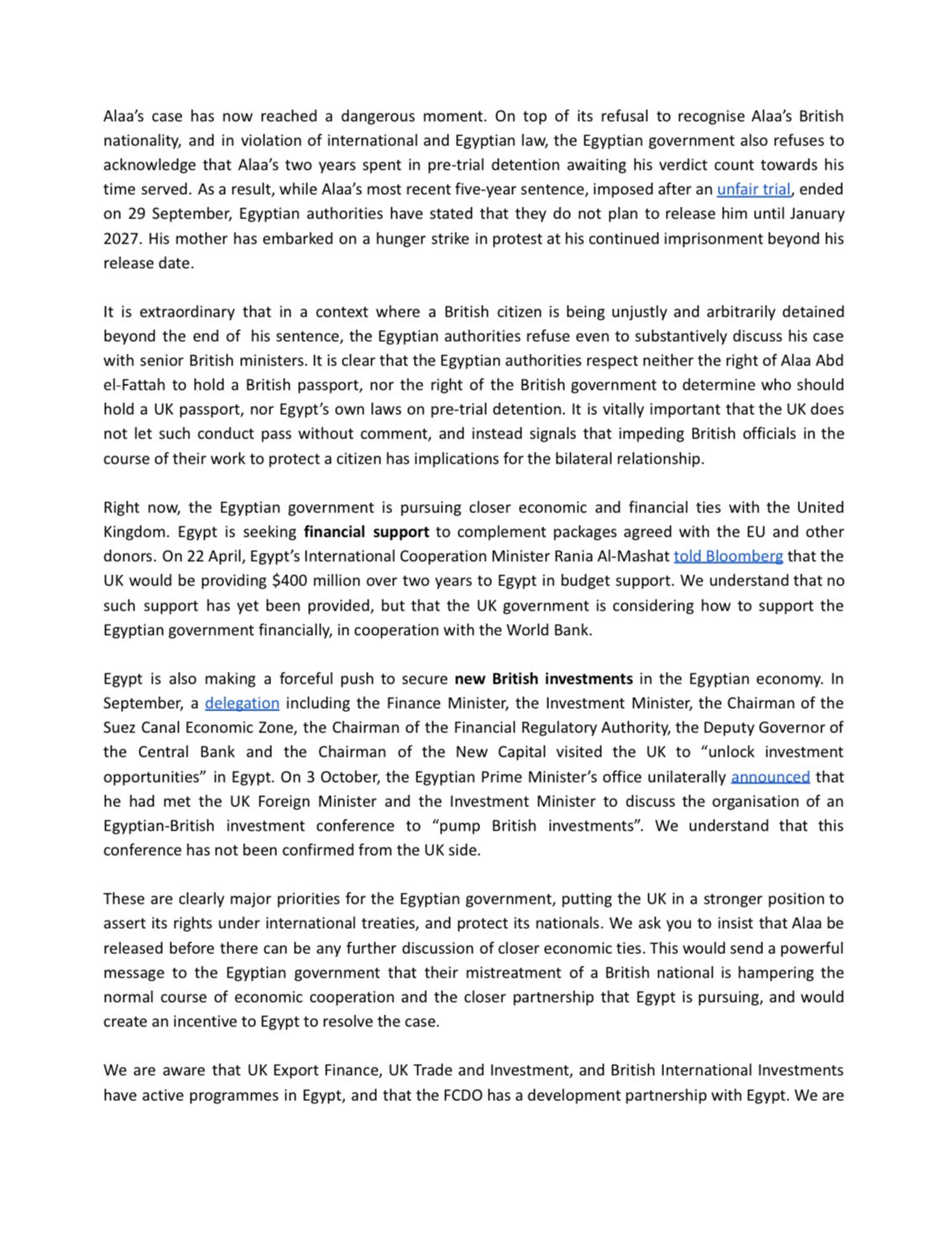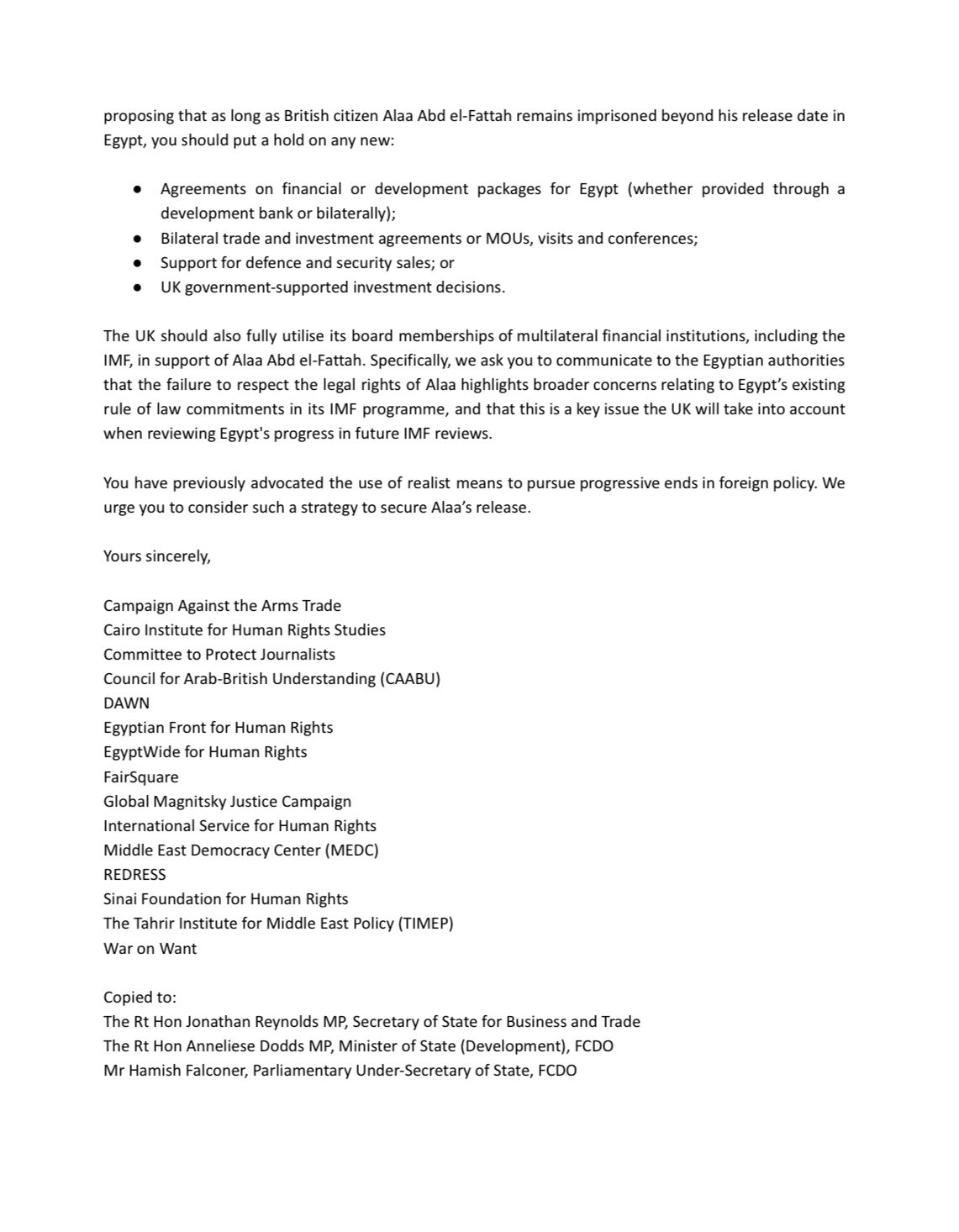Caabu is among 15 British, Egyptian and international organisations who have issued a joint letter calling on UK Foreign Secretary David Lammy to put a hold on any new economic or financial partnerships with Egypt, unless and until British national and writer Alaa Abd el-Fattah is freed.
British government urged to pause financial cooperation with Egypt until UK national Alaa Abd el-Fattah freed
5 November 2024
15 British, Egyptian and international organisations have called on UK Foreign Secretary David Lammy to put a hold on any new economic or financial partnerships with Egypt, unless and until British national and writer Alaa Abd el-Fattah is freed.
The British government has been seeking Alaa Abd el-Fattah’s release since 2022 but on 29 September, when his five year sentence came to an end, the Egyptian authorities did not release him, refusing to consider the two years he spent in pre-trial detention as “time served”. The FCDO states that the Egyptian government “does not recognise Mr El-Fattah as a British national”.
Meanwhile Egypt is vigorously pursuing new investments and financial support from the UK. On 3 October, the Egyptian Prime Minister’s office announced that he had discussed with British ministers the idea of an UK-Egypt investment conference to “pump British investments”. The UK is the largest single foreign investor in Egypt, and the annual trade between the two countries is around £4.5 billion.
In a joint letter sent on 1 November, the organisations called on David Lammy to, “insist that Alaa be released before there can be any further discussion of closer economic ties. This would send a powerful message to the Egyptian government that their mistreatment of a British national is hampering the normal course of economic cooperation and the closer partnership that Egypt is pursuing, and would create an incentive to Egypt to resolve the case.” In opposition, David Lammy was a strong supporter of the campaign for Alaa’s release, and called for the previous Conservative government to progress the case by using the “tremendous leverage” of Britain’s large trading relationship with Egypt.
Alaa Abd el-Fattah has been imprisoned almost continuously since 2014. His mother, Laila Soueif, has been on hunger strike for more than a month in protest at her son’s continued imprisonment, telling the BBC that, “I’m keeping it up until Alaa is free or I’m taken to hospital in a terrible state. His life has been on hold for 11 years. It can’t go on.” Last month she met a new All-Party Group in the British parliament, chaired by Conservative MP Alicia Kearns, that is advocating for British nationals arbitrarily detained abroad.
As long as Alaa remains imprisoned, the 15 organisations are calling on the British government to put a hold on any new:
- Agreements on financial or development packages for Egypt;
- Bilateral trade and investment agreements or MOUs, visits and conferences;
- Support for defence and security sales; or
- UK government-supported investment decisions.
The signatory organisations of the letter to British Foreign Secretary David Lammy are: Campaign Against the Arms Trade, Cairo Institute for Human Rights Studies, Committee to Protect Journalists, Council for Arab-British Understanding (CAABU), DAWN, Egyptian Front for Human Rights, EgyptWide for Human Rights, FairSquare, Global Magnitsky Justice Campaign, International Service for Human Rights, Middle East Democracy Center (MEDC), REDRESS, Sinai Foundation for Human Rights, The Tahrir Institute for Middle East Policy (TIMEP), War on Want.
The full text of the letter sent to Foreign Secretary David Lammy on 1 November 2024, follows:
Dear Foreign Secretary,
We are writing as a group of 15 organisations deeply concerned about the case of British-Egyptian writer Alaa Abd el-Fattah, following the refusal of the Egyptian government to release him when his sentence ended on 29 September. We are writing to request that the UK government make clear to the Egyptian authorities that Alaa be released at once and as a necessary requirement before any consideration will be given to new economic or financial partnerships with Egypt.
The UK government has been seeking Alaa’s release since 2022. However, according to the FCDO, the Egyptian government refuses to recognise these efforts as it “does not recognise Mr El-Fattah as a British national and is refusing consular access”. In November 2022, the UK’s former Middle East Minister told parliament that consular access “should be granted as a matter of fact” and that its denial by Egypt was “unacceptable”. Amnesty International supporters have called on Egypt to grant consular access. As Shadow Foreign Secretary, you proposed that the UK should take specific measures in response to Egypt’s denial of consular access, noting the “tremendous leverage” that the UK had by virtue of its large trading relationship with Egypt. The UK government has previously stated in court that international treaty obligations relating to consular access are of “vital importance for both the protection of individuals and the maintenance of good interstate relations”.
Alaa’s case has now reached a dangerous moment. On top of its refusal to recognise Alaa’s British nationality, and in violation of international and Egyptian law, the Egyptian government also refuses to acknowledge that Alaa’s two years spent in pre-trial detention awaiting his verdict count towards his time served. As a result, while Alaa’s most recent five-year sentence, imposed after an unfair trial, ended on 29 September, Egyptian authorities have stated that they do not plan to release him until January 2027. His mother has embarked on a hunger strike in protest at his continued imprisonment beyond his release date.
It is extraordinary that in a context where a British citizen is being unjustly and arbitrarily detained beyond the end of his sentence, the Egyptian authorities refuse even to substantively discuss his case with senior British ministers. It is clear that the Egyptian authorities respect neither the right of Alaa Abd el-Fattah to hold a British passport, nor the right of the British government to determine who should hold a UK passport, nor Egypt’s own laws on pre-trial detention. It is vitally important that the UK does not let such conduct pass without comment, and instead signals that impeding British officials in the course of their work to protect a citizen has implications for the bilateral relationship.
Right now, the Egyptian government is pursuing closer economic and financial ties with the United Kingdom. Egypt is seeking financial support to complement packages agreed with the EU and other donors. On 22 April, Egypt’s International Cooperation Minister Rania Al-Mashat told Bloomberg that the UK would be providing $400 million over two years to Egypt in budget support. We understand that no such support has yet been provided, but that the UK government is considering how to support the Egyptian government financially, in cooperation with the World Bank.
Egypt is also making a forceful push to secure new British investments in the Egyptian economy. In September, a delegation including the Finance Minister, the Investment Minister, the Chairman of the Suez Canal Economic Zone, the Chairman of the Financial Regulatory Authority, the Deputy Governor of the Central Bank and the Chairman of the New Capital visited the UK to “unlock investment opportunities” in Egypt. On 3 October, the Egyptian Prime Minister’s office unilaterally announced that he had met the UK Foreign Minister and the Investment Minister to discuss the organisation of an Egyptian-British investment conference to “pump British investments”. We understand that this conference has not been confirmed from the UK side.
These are clearly major priorities for the Egyptian government, putting the UK in a stronger position to assert its rights under international treaties, and protect its nationals. We ask you to insist that Alaa be released before there can be any further discussion of closer economic ties. This would send a powerful message to the Egyptian government that their mistreatment of a British national is hampering the normal course of economic cooperation and the closer partnership that Egypt is pursuing, and would create an incentive to Egypt to resolve the case.
We are aware that UK Export Finance, UK Trade and Investment, and British International Investments have active programmes in Egypt, and that the FCDO has a development partnership with Egypt. We are proposing that as long as British citizen Alaa Abd el-Fattah remains imprisoned beyond his release date in Egypt, you should put a hold on any new:
- Agreements on financial or development packages for Egypt (whether provided through a development bank or bilaterally);
- Bilateral trade and investment agreements or MOUs, visits and conferences;
- Support for defence and security sales; or
- UK government-supported investment decisions.
The UK should also fully utilise its board memberships of multilateral financial institutions, including the IMF, in support of Alaa Abd el-Fattah. Specifically, we ask you to communicate to the Egyptian authorities that the failure to respect the legal rights of Alaa highlights broader concerns relating to Egypt’s existing rule of law commitments in its IMF programme, and that this is a key issue the UK will take into account when reviewing Egypt's progress in future IMF reviews.
You have previously advocated the use of realist means to pursue progressive ends in foreign policy. We urge you to consider such a strategy to secure Alaa’s release.
Yours sincerely,
Campaign Against the Arms Trade
Cairo Institute for Human Rights Studies
Committee to Protect Journalists
Council for Arab-British Understanding (CAABU)
DAWN
Egyptian Front for Human Rights
EgyptWide for Human Rights
FairSquare
Global Magnitsky Justice Campaign
International Service for Human Rights
Middle East Democracy Center (MEDC)
REDRESS
Sinai Foundation for Human Rights
The Tahrir Institute for Middle East Policy (TIMEP)
War on Want
Copied to:
The Rt Hon Jonathan Reynolds MP, Secretary of State for Business and Trade
The Rt Hon Anneliese Dodds MP, Minister of State (Development), FCDO
Mr Hamish Falconer, Parliamentary Under-Secretary of State, FCDO




